Estimated reading time: 7 minutes
What is the fortune cookie?
Fortune cookie is a sweet cracker-like cookie most commonly served at the end of a meal at Chinese American restaurants. It is shaped and folded around a fortune paper slip that contains prediction for the future or just general wisdoms.
The American version is made with butter and flour, sweetened with sugar, and flavored with vanilla. These cookies are usually snapped in half to read the fortune papers before eating.
Where did fortune cookies come from?
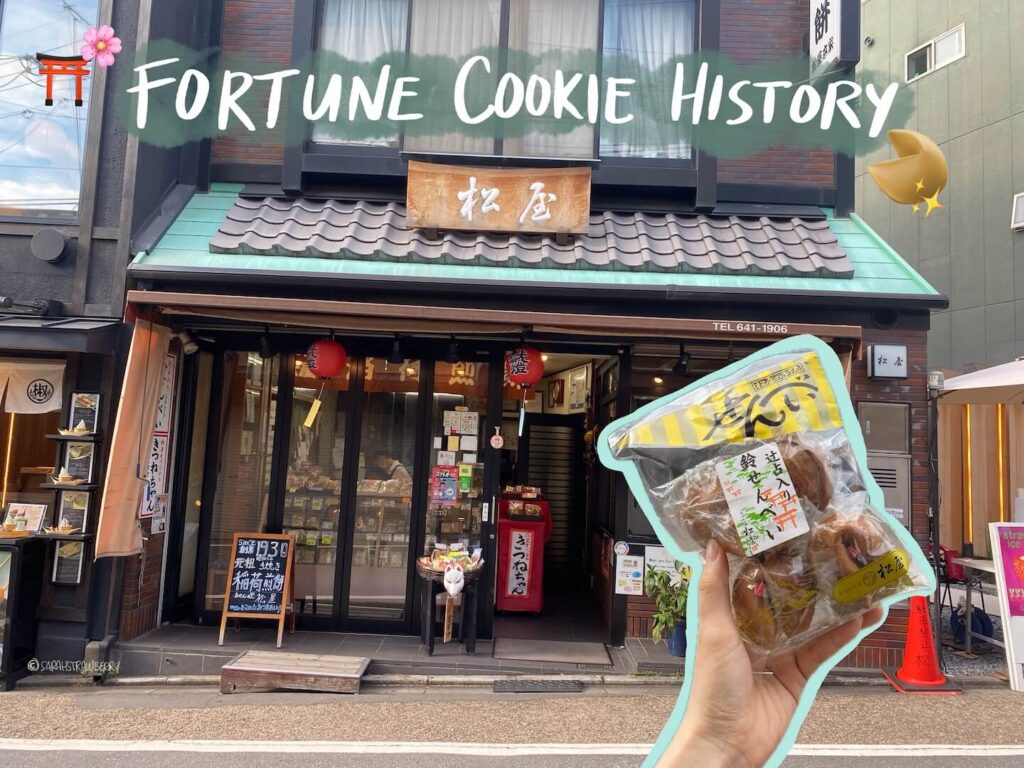
Commonly associated with Chinese food takeout, the fortune cookie is widely believed to be a Chinese American invention. My first encounter with these delightful surprise was with, you guessed it, Panda Express takeouts. Though I think people would appreciate less cryptic messages, opening these crispy confections is one thing we all look forward to after eating our fill in orange chicken.
Interestingly, I was planning my trip to Japan when I saw a Reddit post on the origins of the fortune cookie. When visiting the historic city, some make a stop at a snack shop that is said to inspire the Chinese American version of fortune cookies. Am I reading this right? They actually came from …Kyoto?!
So are fortune cookies Japanese or Chinese?
Historically, the fortune cookie originates from Japan!
Table of contents
Discovering the original fortune cookie in Japan
A trip to Kyoto to seek fortune
It was a terribly hot day in Kyoto, smack dab in the middle of summer. After a fulfilling trip to Uji, we decided to make a stop at a popular Kyoto destination. To do that, we have to stop at this station decorated with red traditional gates all over: Fushimi-Inari Station.
The road surrounding the Inari train station was crowded with tourists coming from all over the world. They are all making the journey for one place that is in everyone’s itinerary: Fushimi Inari temple. But one thing not everyone knows about this neighborhood: this is where fortune cookies are from!
Fushimi Inari Neighborhood
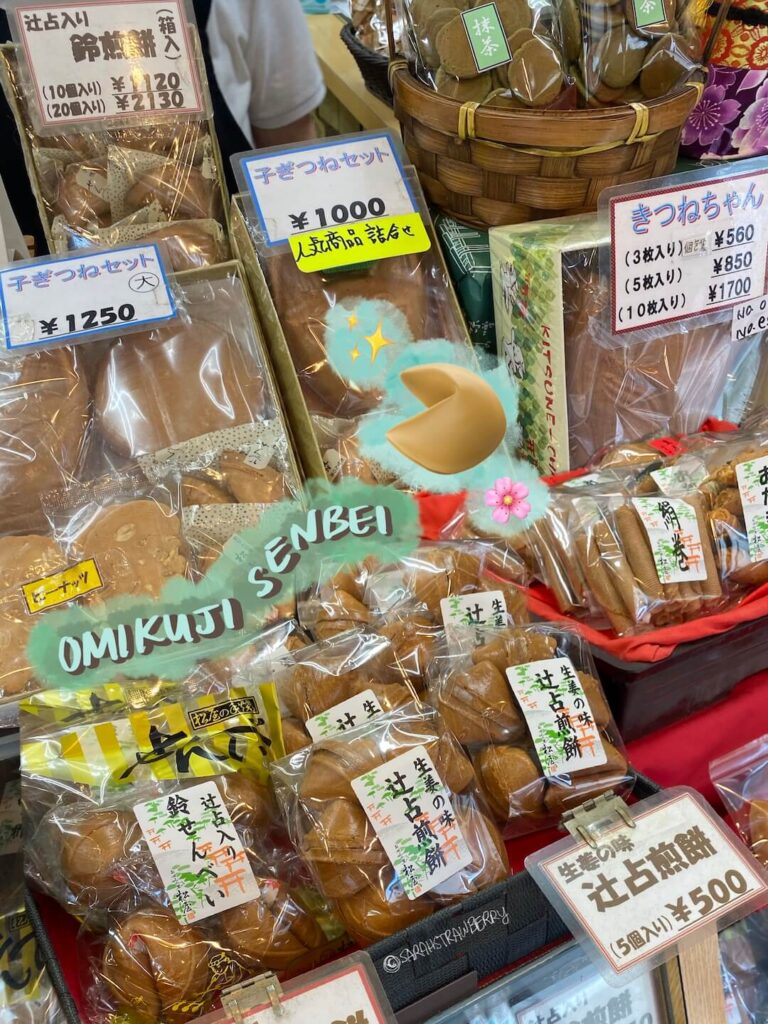
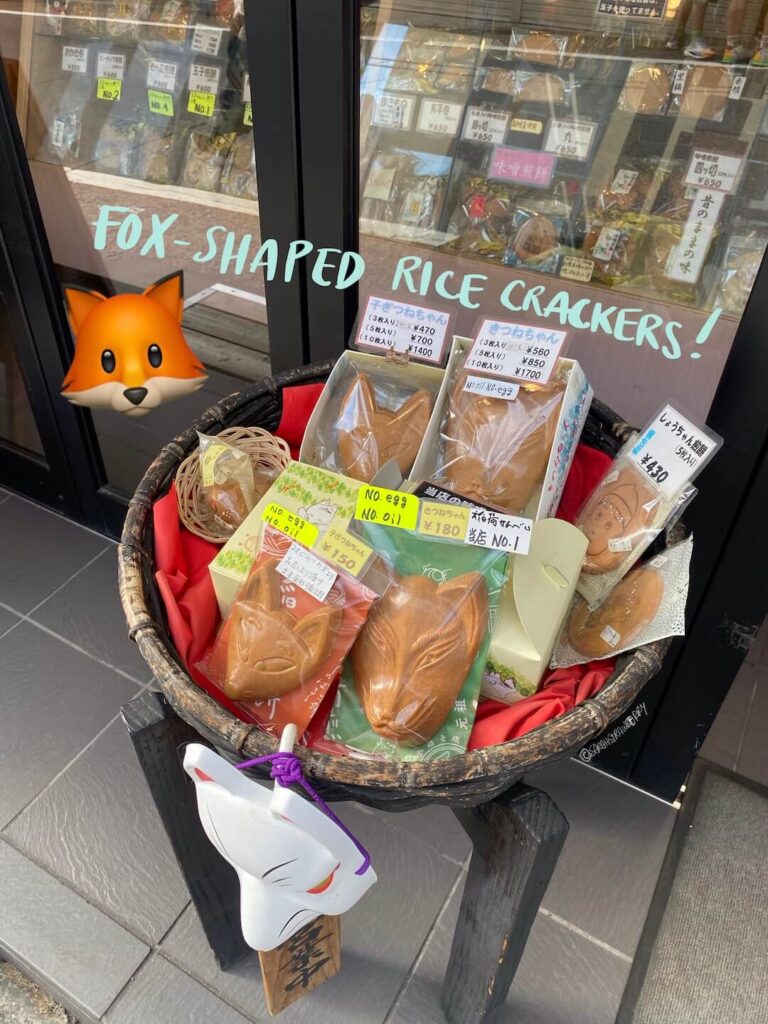
The neighborhood around Fushimi Inari temple is surrounded by centuries-old confectionery shops making these crackers since the Edo period (the 1600s). They are locally known as omikuji senbei and tsujiura senbei! These historic snacks reflect the deep-rooted fortune telling beliefs in the Japanese society.
One store stands out because it is the inspiration for the Chinese-American fortune cookies: Matsuya (おせんの里松屋). This store is just 50 meters away from the Fushimi-Inari Station, and this confectionery shop has been around since 1955. Other than their fortune cookies, they are also famous for their fox head-shaped senbei.
Stories say that a Chinese American man got the inspiration for these lucky crackers after going to Matsuya on his trip to Japan. He then brought the idea back to the United States and made it popular! The rest, is history 🥠
Telling fortunes
Just like how you can purchase omikuji or fortune-telling slips from the local temple, you can also buy it in cookie form. Ahem, as they say, you can have your cookie and get your fortune too!
Tsujiura (辻占), on the other hand, is a public fortune-telling practice that was popular in the Edo period. Tsuji itself means intersection, and people will tell their fortunes by picking out numbers. They will then observe passers-by according to the number they chose.
This old-school practices has
How does the original taste like?
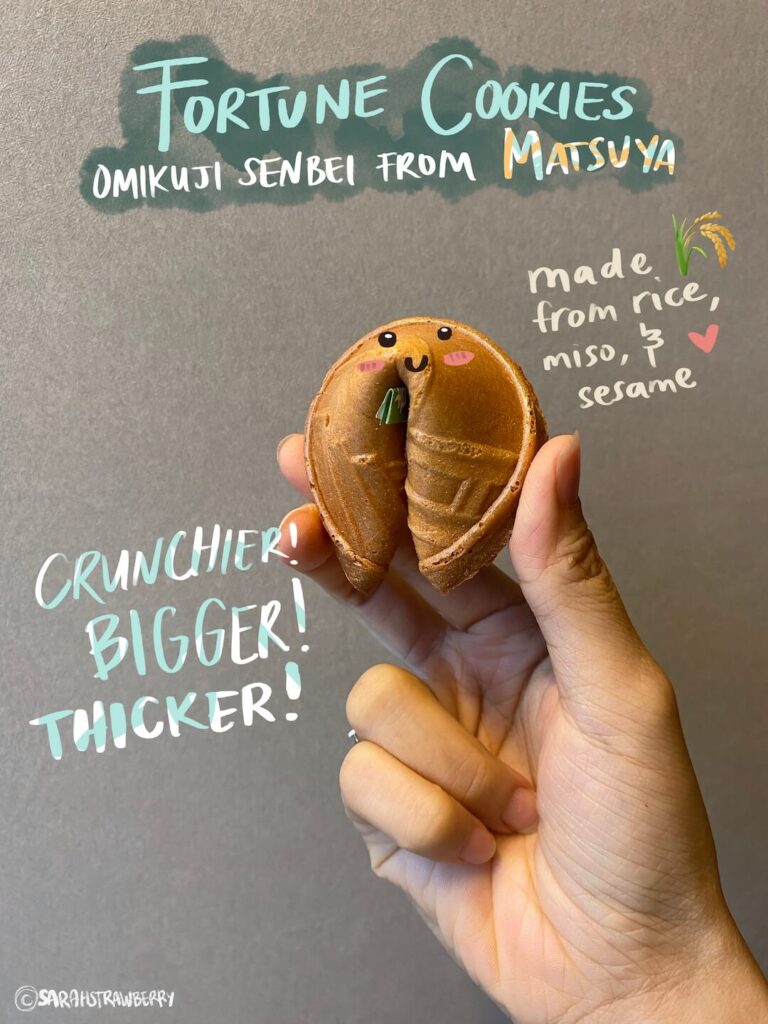
I definitely cannot leave Kyoto without trying out the real deal, can I? So I purchased a bag of 5 cookies from Matsuya for ¥500 ($3.40 USD at the this time of writing). They are browner, bigger, and thicker than the ones I see in the US for sure, and it makes a sound when you shake it. There was a surprise inside!
From the first bite, I felt mellow sweetness and nuttiness that spread out as I chewed. Upon further inspection, the store uses sesame and white Saiyo miso from Kyoto to create their delightful rice crackers. Each cookie is still carefully handmade and folded into the shape we are all familiar with.
Curious about the sound it makes when shaken? There are roasted soybeans put inside the cookie with your fortune slip! Speaking of fortune-telling, here what I found inside it:
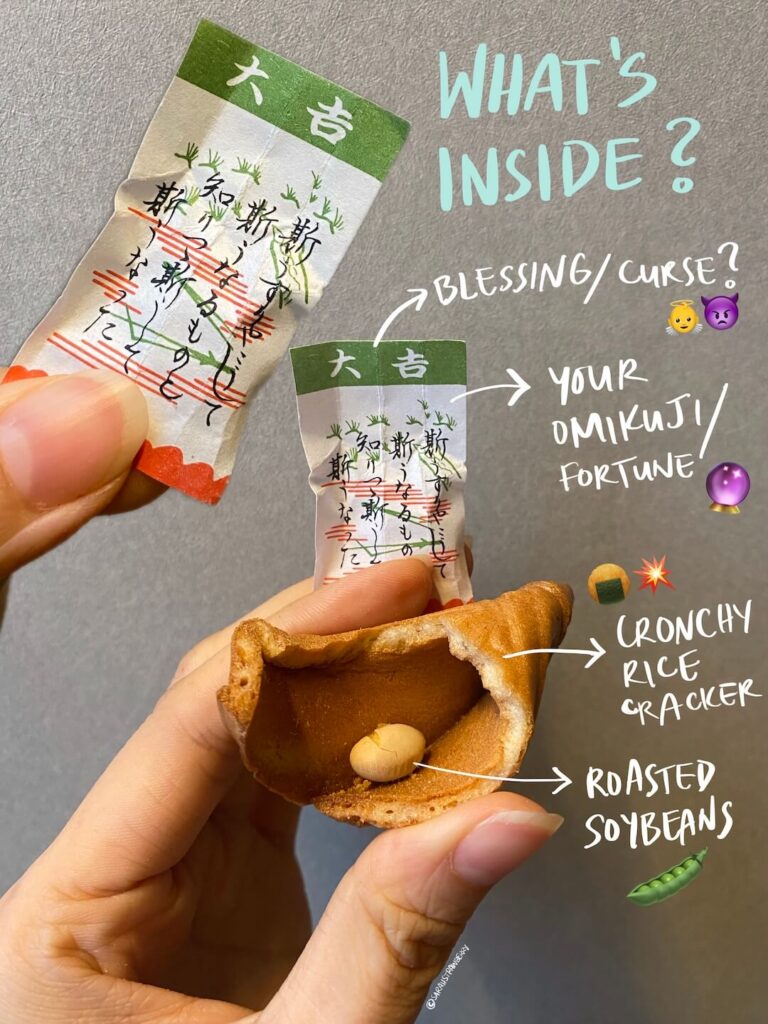
Google Translate did NOT work with this, so I had to ask my Japanese friend for help. She said that it is a quote from an old poem about a couple. The gist of it is that you know what the result would be from a certain action, and that is exactly what happened.
I guess it is typical for an omikuji to include poems, but I kind of feel cheated- how does this relate to my fortune at all?! If anything, is it not about the past?
After some fierce Googling, though, the top two characters are 大吉 (Dai-kichi), which means “great blessing”. I’ll take what I can get! 👍
Japanese-speaking readers, please do comment if you have any further insights 😅
Migration to the States
Why are fortune cookies in Chinese restaurants?
One story is that a Chinese American brought back the idea after visiting the Matsuya store in Kyoto, Japan.
Makoto Hagiwara’s Japanese Tea Garden
Another version of the story involves a Japanese tea shop owner named Makoto Hagiwara. In 1894, he established a popular Japanese Tea Garden in San Fransisco’s Golden Gate Park and brought over this senbei recipe.
He initially served these tea cakes filled with thank-you notes for his customers. It is the earliest historical record on fortune cookies crossing the Pacific and settling on American soil. After gaining more popularity, they evolved into fortune-telling slips we now know.
Unable to keep up with the volumes, the Hagiwaras eventually outsourced the production to Benkyo-do. It is a confectionery shop located in San Fransisco Japantown, but is sadly permanently closed now.
After the Pearl Harbor incident, Japanese Americans were forcefully put into internment camps. Gaps in the market left by Japanese business were filled by Chinese businesses- which includes the snacks made by Japanese bakeries. This dark past paved the way for the popularization of the iconic fortune cookies we know and love.
Fortune cookies in modern times
These confectioneries are now a staple in Chinese-American culture. Besides big names like Panda Express, local Chinese restaurants in the United States usually give out some whether you are dining in or getting takeouts. It is a sweet treat everyone looks forward to at the end of their meal, and I now have a renewed appreciation of its history!
I hope everyone will have a 大吉 (great blessing) today!
P.S. = Follow my Japan trip journey! Random, but this is what I ate as a masochistic plane food reviewer flying ANA.

Watch on TikTok!
@sarahstrawberry_ Plot twist: fortune cookies are NOT from China! 🥠🔮😱 #fortunecookies #japanvlog #japantrip #kyoto ♬ origineel geluid – .⋆୨୧⋆.
Pin It!
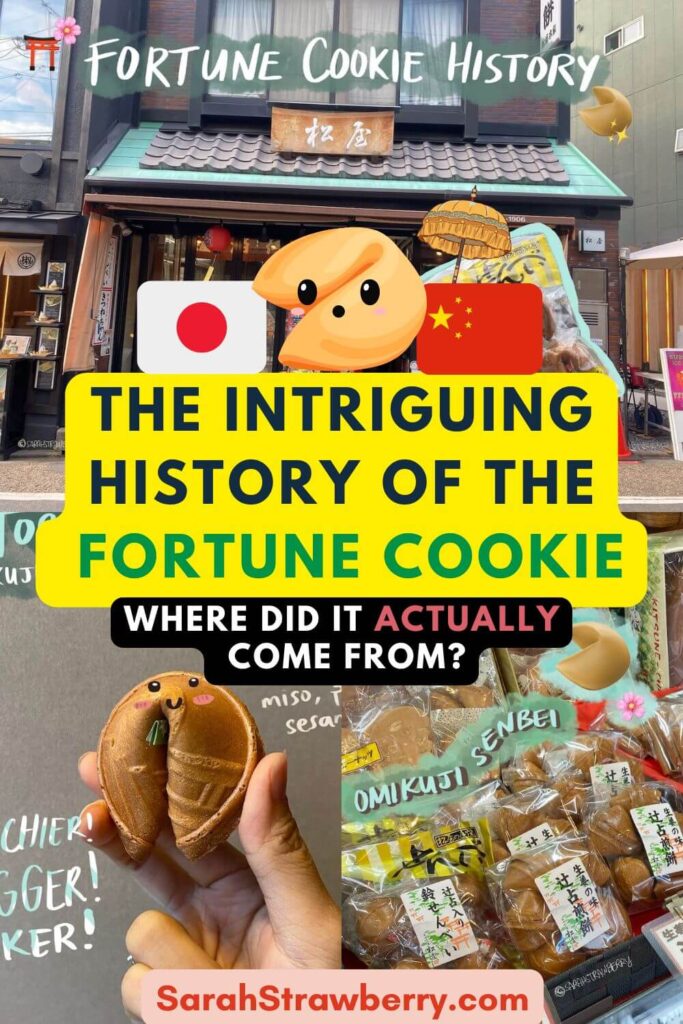

2 comments on “Fortune Cookie and Its Surprising History”